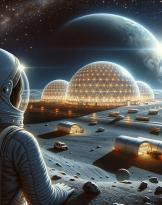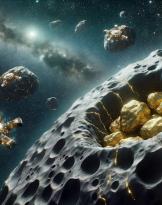Humanity has entered a new era of evolution that promises to change our lives, few are realizing it. Among them is Klaus Schwab, founder and current executive director of the World Economic Forum, the "Davos Forum", which has dedicated a book with the indicative title "The 4 ° Industrial Revolution"1"In which he describes the jump we have made with artificial intelligence (AI). We live, says Schwab, an epoch-making moment, of those studied in history books, comparable to the discovery of the New World in the 1492.
AI, in the literature, is referred to as "general purpose tecnology" (GPT), a technology capable of, as Erik Brynjolfsson explains2 of MIT in Boston, "interrupt and accelerate the march of economic progress".
It had already happened three more times: with steam, which had started the first industrial revolution (1760-1830), with electricity (1870 -1945) that favored the second one, and finally with the digitization in the 80-90 years .
There is however a substantial difference, which distinguishes the previous revolutions from the current one.
During the first three, the introduction of new technologies had modified, each in its own way, the production cycle, breaking it down into several parts entrusted to different machines, but always creating new professional figures with which to absorb the excess workforce.
 So it happened in the nineteenth century with the transfer of large numbers of workers from the countryside to the factories, and similar phenomenon was observed in the following decades, up to the 80-90 years of the last century (although the advent of computers began to progressively reduce the creation of new jobs).
So it happened in the nineteenth century with the transfer of large numbers of workers from the countryside to the factories, and similar phenomenon was observed in the following decades, up to the 80-90 years of the last century (although the advent of computers began to progressively reduce the creation of new jobs).
In other words, in the past the adoption of new GPT technologies constantly "subtracted" direct production capacity for man, but requiring his presence in some stages of processing and as a supervisor of the entire production cycle.
The opposite of what happens today with AI, which operates essentially in the "cognitive" field, the one that most characterizes us among living species.
The availability of computers with enormous computing capacity and the continued production of Big Data (the 90% of available data were created only in the last two years), have greatly expanded the development of AI, to the point that the machines already exceed the human ability in many fields, from speech recognition to simultaneous translation, from facial recognition to the analysis of data and images, and the list could continue.
From the first victory of a computer, Deep Blue of IBM, against the world champion of chess, Garry Kasparov, in the distant 1996 (the Russian won three matches and he equalized two, finally beating the car with a result of 4-2), of the street it was made.
In February 2011, IBM always introduced the Watson system3 three episodes of the US television quiz Jeopardy!, during which he repeatedly defeated the current champion.
The computer, able to answer questions expressed in natural language, was not connected to the Internet, had access to 200 millions of pages of content and to the complete text of Wikipedia, for a total of 4 terabytes of disk space.
It is another, however, the victory that has most marked our time: the one that the AlphaGO computer obtained in May 2017 against the world champion of Go, the Chinese game that includes a lot of infinite combinations.
The system developed by Deep Mind (a Google company) managed to beat the current champion, Ke Jle, three times in a row, convincing Beijing - as explained by the former CEO of Google China, Kai Fu Lee, in his latest book4 -, to accelerate the pace in the development and implementation of AI.
 These examples are sufficient to understand how the revolution underway promises to develop at a speed and breadth never known before, investing all the fields of production of goods and services.
These examples are sufficient to understand how the revolution underway promises to develop at a speed and breadth never known before, investing all the fields of production of goods and services.
In the medical field, radiology and dermatology are just some of the disciplines in which AI is already fully applied. The Watson system, after Jeopardy !, was adopted by the MD Andersen Cancer Center of the University of Texas, the most advanced cancer center in the world, where it analyzes reports and diagnoses based on a database (always updated) of millions of clinical cases (In comparison, even the best physician can only rely on his, however limited, preparation).
Even in many legal, insurance and banking sectors, AI-equipped systems have long been used to evaluate data produced by public and private agencies in order to suggest in real time the profile of a customer, his creditworthiness and spending capacity.
Journalism will be, among the professions, the one destined to disappear more quickly? There are now many online publications that rely on algorithms that can select the most popular news and translate them into articles with a prose and a narrative force equal to the human one.
An example of this: the Dow Jones, the most important source of economic information in the world, is based on an AI system capable of processing 1,5 millions of articles daily to deliver information and metadata useful for stock exchange transactions to end users. .
Also in the military field, the AI is destined to change the reference scenarios. This is explained by the gen. John R. Allen, former ISAF commander and current president of the Brookings Institution on an article5 published last December 27 on the ISPI website.
 Allen believes that "theIA porterà a new era of war in which the processes of decision and action will be significantly faster than anything we have seen before "; a hyper-war in which "l'human being sarà removed from the analysis processes of the'environment, and will have a less direct control over events ".
Allen believes that "theIA porterà a new era of war in which the processes of decision and action will be significantly faster than anything we have seen before "; a hyper-war in which "l'human being sarà removed from the analysis processes of the'environment, and will have a less direct control over events ".
Remaining on the subject, this magazine has many times6 illustrated the projects7 Beijing, in the field of AI.
But what dangers will we face if the aforementioned trend of progressive implementation of AI should continue at the pace known until today.
First of all, ethical risks, present for example in the military domain, essentially linked to the possibility that an "intelligent machine" can decide the life of being human. An eventuality that in the Chinese field does not give rise to particular opposition (Beijing theorises at the tactical level the use of "autonomous" systems of C2 equipped with AI).
There are also dangers in the economic and social field. Some sources, among those quoted by me, estimate in the US in about 40% the number of jobs at risk of automation within the 2030.
An assessment that threatens the emergence of a society characterized by a progressive unemployment of blue and white collars.
It is at stake the affirmation of an economic system no longer focused on traditional factories, but on a few, huge "platforms" that will operate globally - like Amazon - creating immense profits from the sale of goods and services produced by third parties.
 A reality in which the production sites would be characterized by completely robotic and intelligent cycles with a limited human presence; in which the increasing availability of a huge production market (who produces the goods) and the gradual introduction of 3D printers (able to produce objects based exclusively on modeling algorithms) would push the cost of production down more and more, accentuating the disparity of profit between those who produce the good and those who distribute it on the market.
A reality in which the production sites would be characterized by completely robotic and intelligent cycles with a limited human presence; in which the increasing availability of a huge production market (who produces the goods) and the gradual introduction of 3D printers (able to produce objects based exclusively on modeling algorithms) would push the cost of production down more and more, accentuating the disparity of profit between those who produce the good and those who distribute it on the market.
A world in which (human) labor would contribute less and less to the production of profit to the full advantage of capital, with increasing social inequality and enormous problems of public order.
It is no coincidence that they are more and more, and among these are the main Silicon Valley gurus, Mark Zuckerberg in the lead, those who theorize a universal income of citizenship (consumers, on the other hand, are still necessary).
But it would be another the most fearful danger in the hypothesis of an immeasurable development of AI: that "the cars"- to say it as Jerry Kaplan8, the highest expert in the sector - "they must one day be sufficiently intelligent to be programmed and improved to the point of becoming independent".
They call it "Singularity", and at that point we would have already entered a new era, a human post, but we hope that science-fiction writers are the only ones to describe it.
2"The new machine revolution", Erik Brynjolfsson - ed. Universal Economics Feltrinelli 2017
3https://it.wikipedia.org/wiki/Watson_(artificial intelligence)
4"AI Super-Powers, China, SiliconValley and the new world order", Kai Fu Lee - ed. Houghton Mifflin Harcourt 2018
8"Artificial Intelligence", Jerry Kaplan - ed. LUISS 2017
(photo: US Navy / Ministry of National Defense of the People's Republic of China)












